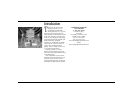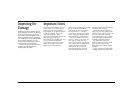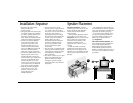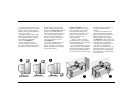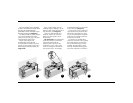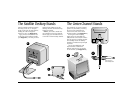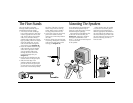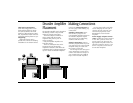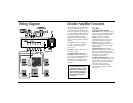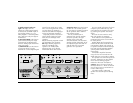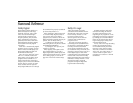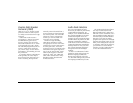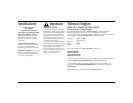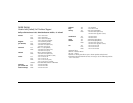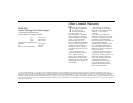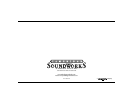
Dolby Digital
Dolby Digital (earlier called AC-3)
delivers five discrete full-range
channels (left front, center, right
front, left surround and right
surround) plus a separate Low
Frequency Effects (LFE) channel.
Many soundtracks on the latest
generation laser discs, DVDs and
High Definition Television (HDTV),
are encoded with Dolby Digital
technology.
When a 5.1 channel Dolby Digital
program source is playing, such as
from a Creative PC-DVD player, the
Dolby Digital indicator light will
illuminate automatically.
Note: Not every section of a DVD
will be 5.1-channel encoded. On
many DVD’s, only the main movie
program will be available in 5.1
channel sound. Other supporting
chapters (like a “Director’s Comment”
section) may be in stereo or mono.
These sections will not light the
Dolby Digital indicator even though
Dolby Pro Logic
Dolby Surround is an earlier
surround sound standard which is
decoded with a Pro Logic processor
in the DeskTop Theater 5.1. The
Pro Logic steering circuitry
derives separate center and rear
channels from encoded stereo
program sources.
Pro Logic processing provides a
convincing movie soundfield when
the material is specifically encoded
for Dolby Surround. Most older
stereo movie soundtracks will only
be encoded for Dolby Surround, even
though the program source may be a
DVD’s digital output. Most DVD’s
containing Dolby Surround program
material will cause both the Dolby
Digital and Digital Pro Logic lights to
illuminate. DeskTop Theater 5.1 will
decode these Dolby Surround
programs through the digital Pro
Logic decoder automatically.
the sound will be properly reproduced
by the DeskTop Theater 5.1.
When listening to DVD movies with
5.1 channel Dolby Digital sound, be
sure to listen only to the digital
program source and not a mix of the
digital and analog signals that may be
present. You can insure this by:
1) making sure all three CMSS
indicator lights are off (MUSIC, MOVIE
and STEREO/FOURPOINT).
2) muting the “CD” input of your
computer’s software.
When playing a DVD game with a
mix of Dolby Digital 5.1 sound (a
digital signal at the SPDIF input) and
sound card wavetable output (a signal
at the analog input), be sure to en-
gage one of the three CMSS settings.
CD-ROMs and CD’s with Dolby
Surround encoding will feature
the Dolby Surround logo at the
beginning of the program or on the
packaging. Process these programs
by making sure all CMSS indicator
lights are off and selecting the Pro
Logic Analog Input setting of the
Surround Mode button.
Do not select a Pro Logic decoding
mode if the program material is
not encoded for Dolby Surround.
Excessive center channel output
will result, and most stereo effect
will be lost. Use CMSS “Movie” or
“Music” modes to upmix stereo
programs to a realistic 5.1 channel
sound field.
11
Surround Reference



